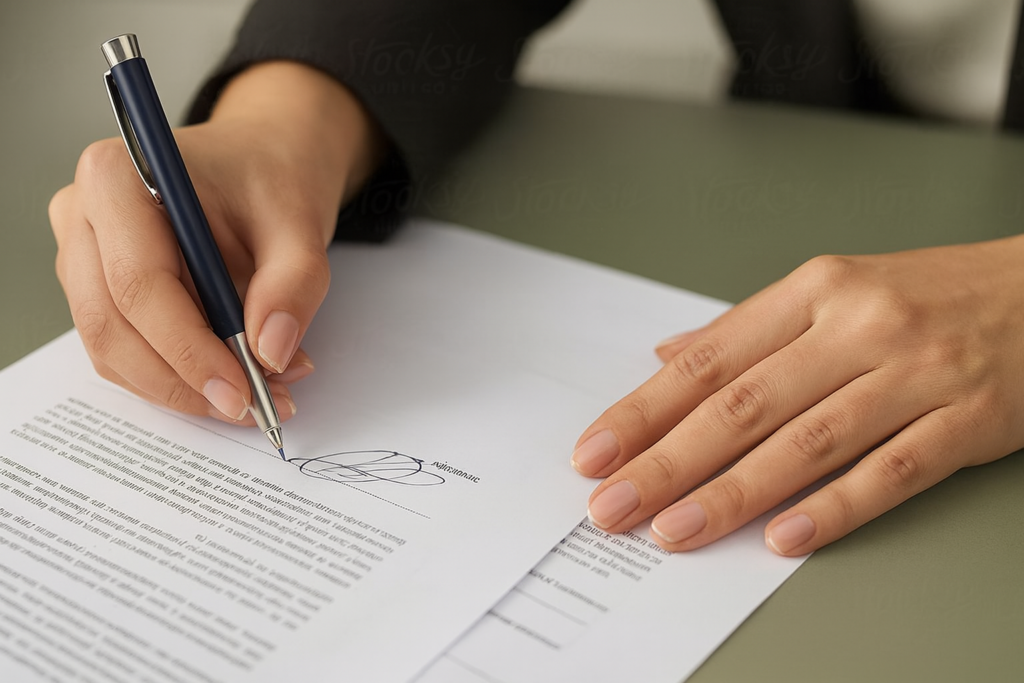A notary statement in Florida is more than a signature and a stamp – it is a vital legal assurance that confirms the authenticity of signatures and the willingness of signers involved in official documents. As discussed many times by our team, this legal statement, when executed correctly, helps prevent fraud and ensures the integrity of documents used in real estate transactions, affidavits, power of attorney, and many other legal instruments.
If you’re dealing with official paperwork here in the state of Florida, understanding what a notary statement is and how it works can save you from costly errors and legal complications. So, read this article and be up to speed with all the details.
You may also like: Should a promissory note be notarized? Benefits and requirements
What is a notary statement in Florida?
A notary statement in Florida is a written declaration that accompanies a notarized document, affirming that the notary has verified the identity of the signer and observed the signing process. This statement confirms that the signer appeared before the notary, was identified properly, and signed the document willingly and knowingly.
Florida law, in particular, is clear and specific when it comes to the content and structure of this statement. The notary statement must include several key components: the date of notarization, the name of the person whose signature is being notarized, the type of notarization (acknowledgment or jurat), and the location where the notarization occurred. In addition, the notary must include their signature, printed name, commission expiration date, and official seal.

This statement is not an optional addition. It is a legal requirement that ensures the notarization is valid and enforceable under our law. If a notary statement in Florida is missing or incorrect, the entire document may be rejected by courts, banks, or other institutions.
Types of notary statements in Florida
There are two primary types of notary statements in Florida: acknowledgments and jurats. Each serves a different purpose and is used in different legal contexts.
Acknowledgment statements
An acknowledgment notary statement in Florida is used when a signer confirms that they signed a document voluntarily. The notary does not have to witness the actual signing, but the signer must appear in person and declare that the signature is theirs. This type of statement is commonly used in real estate transactions, deeds, and powers of attorney.
The typical wording for an acknowledgment in Florida includes phrases like “acknowledged before me” and must include the method used to identify the signer, such as personal knowledge or a government-issued ID.
Jurat statements
A jurat notary statement in Florida, on the other hand, requires the signer to swear or affirm that the contents of the document are true. The signer must sign the document in the presence of the notary, and the notary administers an oath or affirmation. This type of statement is often used in affidavits and depositions.
The wording of a jurat includes phrases such as “sworn to and subscribed before me,” followed by the notary’s signature and seal. Again, the identification of the signer must be properly documented.
Legal requirements for a notary statement in Florida

To be considered legally valid, a notary statement in Florida must adhere to several statutory requirements. Florida Statute 117 outlines the responsibilities of notaries and the specific language that should be included in notarial certificates.
First, the notary must confirm the identity of the signer using acceptable forms of identification. These include a Florida driver’s license, a U.S. passport, or any other government-issued ID that includes a photo and signature. If the signer does not have ID, two credible witnesses may be used, but these witnesses must know the signer personally.
Second, the document must be signed in accordance with the type of notarization. For acknowledgments, the signer can sign before appearing in front of the notary, but for jurats, the signing must occur in the notary’s presence.
Third, the notary must complete the notarial certificate using the correct verbiage. Florida provides sample wording for both acknowledgment and jurat statements. Deviating from this wording can render the document invalid.
Lastly, the notary must affix their official seal, which includes their commission number and expiration date. Without this seal, the notary statement in Florida is incomplete and unenforceable.
Common mistakes to avoid when using a notary statement in Florida
One of the most common mistakes is omitting the notary statement entirely. A signature and seal alone are not sufficient under Florida law – the notary must complete the proper notarial certificate.
Another frequent error is using the wrong type of notary statement. For example, using an acknowledgment when a jurat is required can invalidate the document; therefore, it is essential to know what type of notarization your document requires.
Improper identification is another pitfall. If a notary fails to properly verify the signer’s identity or uses expired identification, the notarization may be challenged.

Lastly, using incorrect or outdated verbiage in the notary statement can cause delays or rejection of the document by courts or agencies. Always ensure the language used aligns with Florida statutory requirements.
The role of the notary public in Florida
A notary public in Florida acts as an impartial witness to the signing of important documents. As mentioned, the notary ensures that the individual signing the document is who they say they are and that they are signing willingly and without coercion.
In addition to verifying identity, the notary also keeps a detailed record of each notarization in a journal, although this is not mandatory in Florida. This journal can serve as a vital piece of evidence if the notarization is ever questioned in a legal context.
Furthermore, Florida notaries are prohibited from providing legal advice unless they are licensed attorneys. Their role is limited to witnessing signatures, administering oaths, and completing notarial certificates.
When to seek our professional notary services
While some documents may appear simple, many legal forms have specific requirements that can be difficult to navigate without experience. If you are unsure about the type of notary statement in Florida you need, or if your document has multiple signers in different locations, it is wise to seek the assistance of a certified notary!

Professional notaries like us understand the nuances of Florida law and can ensure your documents are notarized accurately and legally. Whether you’re signing a will, handling mortgage paperwork, or finalizing a business agreement, working with a trained notary can save time, money, and stress.
Our notaries are available across Central Florida and can travel to your home, office, hospital, or even your local coffee shop. In Mobile Notary, we make the notarization process seamless, convenient, and fully compliant with state laws.
This means our services are designed to meet your needs – so let us bring accuracy and peace of mind to your documentation. Contact Mobile Notary Orlando today and ensure your notary statement in Florida is handled with the utmost professionalism!






